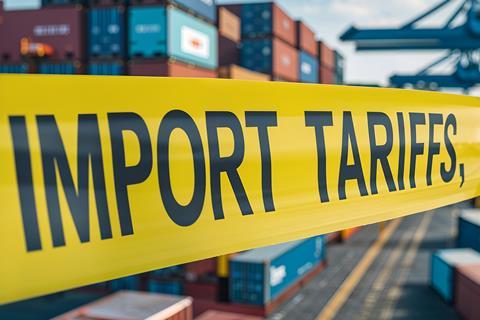Agricultural bodies warn of ‘catastrophic’ consequences for the fresh produce sector as the US threatens to impose tariffs of up to 50 percent on imports from key trading partners

The past week has seen a flurry of tariff-related activity in the US, adding to concerns and confusion for the fresh produce business in a number of countries around the world.
On Saturday, US president Donald Trump threatened a new 30 per cent tariff on imports from the EU and Mexico, effective 1 August, after weeks of negotiations failed to reach mutually agreed outcomes.
Both the EU and Mexico called the tariffs “unfair and disruptive” and restated their commitment to securing trade deals before the end of July.
“The 30 per cent tariffs threatened by Trump are an unacceptable proposal,” said Cristiano Fini, president of Italian agricultural body Cia. “Europe must be united and not halt negotiations. We must avoid a trade war with the United States, which would be catastrophic for the entire agri-food sector.”
Spanish export association Fepex pointed to the major deficit that the US runs with the EU when it comes to fresh produce trade.
“In Chapters 7 and 8 of the tariff code, which include fresh fruits and vegetables, nuts, and legumes, the US-EU trade balance shows a deficit of €2.038bn, driven by imports of nuts,” it observed.
“EU imports from the US under the aforementioned tariff chapters amounted to €2.702bn in 2024, while EU exports amounted to €664mn.”
Spain also has a deficit in its fresh produce with the US, it added. “Spanish imports of these products in 2024 amounted to €543mn, while exports amounted to €190mn, resulting in a deficit for Spain of €353mn.”
Trump has also announced that new or higher tariffs will be imposed on imported goods from other countries – among them Brazil, Canada, Japan, South Africa, and South Korea – from next month.
These involve a new proposed 50 per cent tariff on Brazilian agricultural exports, including citrus and juice, and a 30 per cent duty on South African goods – a move that would end the latter’s duty-free access under the Africa Growth and Opportunities Act.
As a result, South African citrus exporters now face the very real possibility that their place in the US – a market that has grown considerably in recent years – may no longer be viable.
“It’s going to have a huge impact,” Citrusdal-based farmer Krisjan Mouton told Reuters. “It’s not profitable to export anymore to the USA.”
Deep concerns
On 9 July, Trump threatened a 50 per cent tariff on all goods out of Brazil, effective 1 August, and called for an investigation into what he described as “Brazil’s continued attacks on the Digital Trade activities of American Companies, as well as other unfair Trading Practices.”
In response, Brazil’s president Luiz Inácio Lula da Silva said his country would introduce a retaliatory 50 per cent tariff on imported US goods.
Guilherme Coelho, president of fruit industry body Abrafrutas, said his organisation was “deeply concerned” about the news, pointing out that the fruit trade between Brazil and the US generated US$148mn for the sector and the Brazilian economy in 2024.
“This figure demonstrates that the US has been an important trading partner for Brazilian fruit production, and that trade relations between Brazilian exporters and American importers have, to date, been guided by mutual respect, balance, and a high level of professionalism,” he commented.
“The Brazilian fruit industry wants to continue exporting its products to the US, and American importers certainly want to rely on our fruit to supplement their retail supply, in a win-win business model,” he added.
“It was through this model that North American consumers gained access to tasty and safe tropical fruits, which have contributed to the health and well-being of that society. The continuation of this process is a legitimate aspiration of entrepreneurs in both countries.”
Meanwhile, it has been reported that a 17 per cent tariff on fresh tomato imports from Mexico, would begin on 14 July, ending the countries’ long-standing Tomato Suspension Agreement and likely pushing up prices for consumers.
But Trump’s latest statements suggest the country could soon face a 30 per cent import tariff.
Topics
- Africa
- Algeria
- Asia
- Austria
- Bangladesh
- Belgium
- Bosnia and Herzegovina
- Brazil
- Bulgaria
- Canada
- Croatia
- Cyprus
- Czech Republic
- Denmark
- Estonia
- Europe
- Finland
- France
- Fruit
- Germany
- Greece
- Hungary
- Indonesia
- Ireland
- Italy
- Japan
- Latvia
- Libya
- Liechtenstein
- Lithuania
- Luxembourg
- Malaysia
- Malta
- Markets
- Mexico
- Moldova
- Myanmar
- Netherlands
- North America
- Philippines
- Poland
- Portugal
- Production & Trade
- Romania
- Serbia
- Slovakia
- Slovenia
- South Africa
- South America
- Spain
- Sri Lanka
- Supply
- Sweden
- Tariffs
- Thailand
- Tunisia
- United States
- Vegetables











